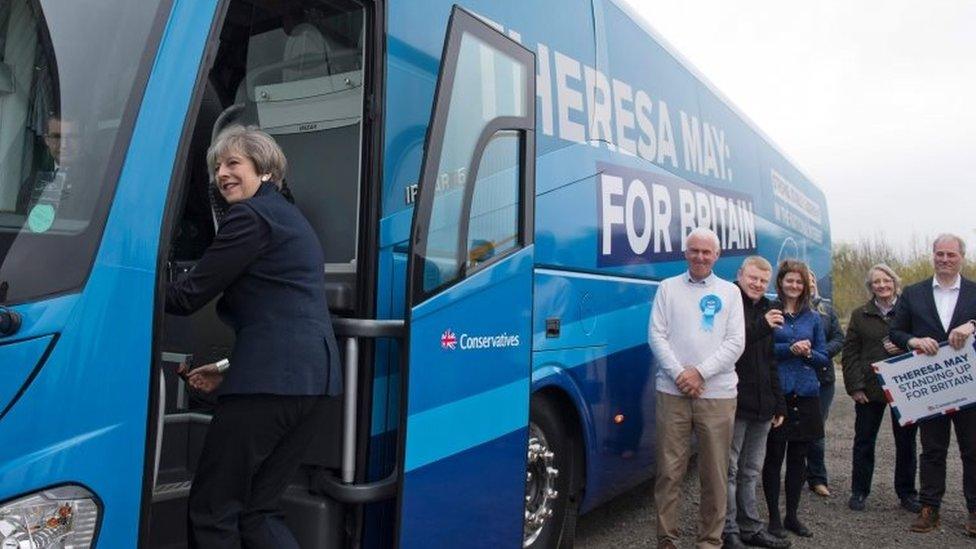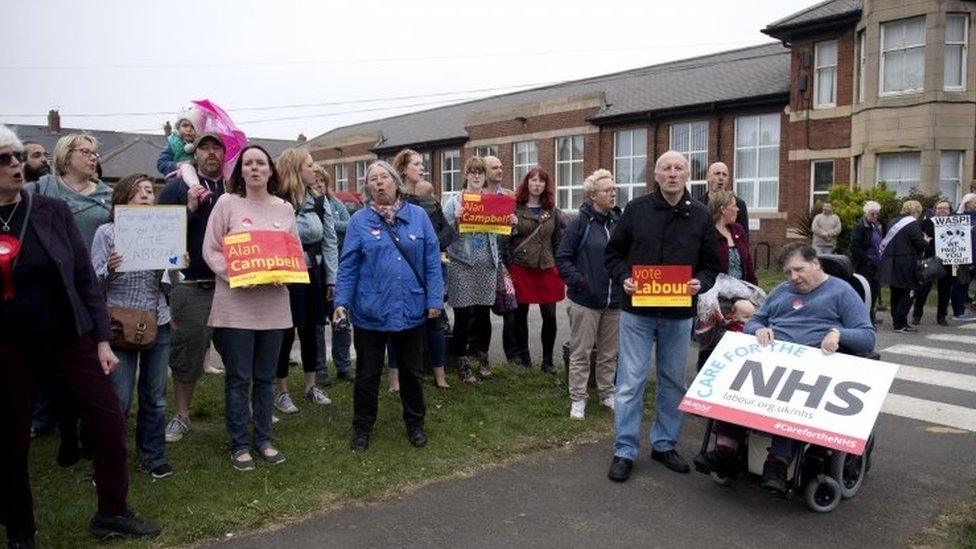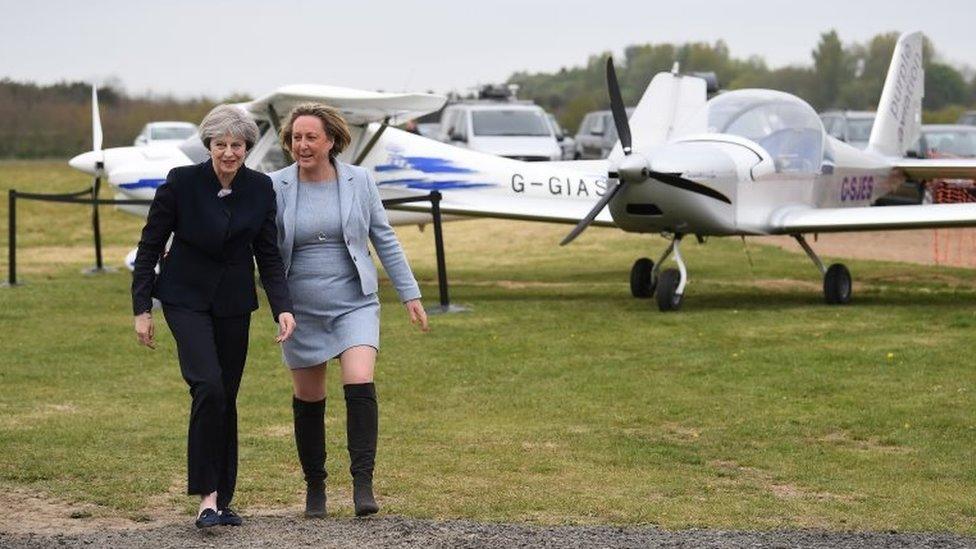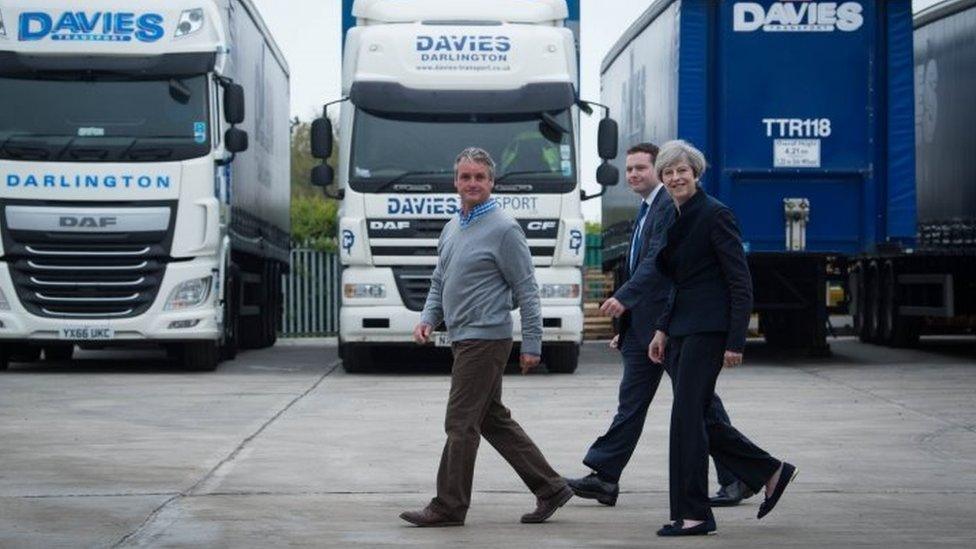General Election 2017: May parks her bus in Labour heartlands
- Published

Tory aides joked today that the prime minister's new election battle bus was to be known in fact, as a "campaign coach".
It is, after all hard to picture the prime minister as someone who was ever particularly fond of taking the bus.
With its fresh fruit, supplies of diet coke and Marks and Spencer's sandwiches, the bus or coach was pristine and it felt all rather genteel, at least on Day One, with Theresa May telling us as she boarded, she'd been on every mode of transport so far in the campaign, "except a horse".
There is nothing gentle though about what she and the Tories are trying to do with the "campaign coach" and every other electoral tool at their disposal.
The prime minister's blue bus won't just be criss-crossing the country randomly, it won't just be going round and round in ever decreasing circles in Midlands marginals where elections are normally lost and won.
But from its start in an airfield in one of the few pockets of Tory territory in the North East of England, in Felton in Northumberland, at lunchtime, the bus wasted no time in heading for Labour seats, and Labour seats that in more normal times, shouldn't really be in play.

Mrs May was met with Labour protests in North Tyneside
By the end of today, the prime minister has already visited 23 Labour held seats, including some that should be safe as houses.
One of today's stops, for example, was Tynemouth, won by Labour in 1997, where the Labour sitting MP has a majority of more than 8,000.
But guess what, at the last election more than 12% of voters there chose UKIP and it's likely that a chunk of them will switch across, and how many Labour voters will be receptive to Theresa May's message?
She is willing to be brutal in her call to the public, saying she "respected" the political choices that voters in the North East had made for years to stay with Labour, but slamming Jeremy Corbyn, John McDonnell and Diane Abbott too, in one of the most personal attacks of the campaign so far.
The grim reality for the Labour Party is that many of their own candidates standing again as MPs privately share her acerbic analysis.
But there is nothing remotely certain about the Tories being able to scoop up seats like that, nothing certain at all.
With only a few hours notice of her visit, a group of protestors had gathered outside the venue where she was to speak.

Theresa May visits an airfield with Tory candidate Anne-Marie Trevelyan
Angry about seven years of austerity, fracking, or the EU, the message from the crowd was that the Tories were not welcome, and there was no way they can win on that turf.
Long-held Labour values die hard. And with sluggish wages, public sector cuts, pressure on housing, inflation, there is a long list of reasons, on top of historic loyalties, why many voters, whether here or in other traditional Labour areas, will simply never switch.
There is a long way to go.
Jeremy Corbyn's allies believe the gap in the polls will narrow.
But privately many senior Tories are hopeful of a bigger prize in this election than a majority.
Not since 1997 has the Conservative Party really been able to claim that they are national party. Just as the pendulum swung to Labour representation in nearly every part of the UK then, it took away the Tories' reach.

And continues the transport theme in Darlington
They were practically extinct in Scotland, an endangered species in the North East of England, rare in much of North West too and in Wales.
The Tory dream 20 years later is to reverse that, to swing that back.
The theoretical long term prize that the polls suggest is in reach next month is to restore the Conservatives to being a national party, no longer an alien political force in the North East, in Scotland or Wales.
Just in case you hadn't noticed, the Tory bus drove past the iconic Angel of the North this afternoon, making sure that the cameras were there to bear witness - an image that after the election could feel like a symbol of Conservative over optimism, or a symbol of a significant change.